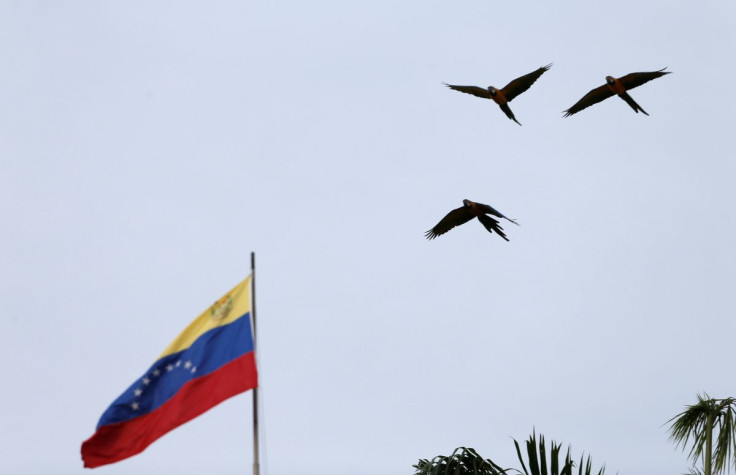U.S., Venezuela Discuss Easing Of Sanctions, Make Little Progress -sources

U.S. and Venezuelan officials discussed the possibility of easing oil sanctions on Venezuela but made scant progress toward a deal in their first high-level bilateral talks in years, five sources familiar with the matter said, as Washington seeks to separate Russia from one of its key allies.
Both sides used Saturday's meeting in Caracas to present what one of the sources described as "maximalist" demands, reflecting longtime tensions between the Western Hemisphere's main power and one of its biggest ideological foes.
A U.S. delegation led by Juan Gonzalez - the top White House Latin America adviser - and Ambassador James Story held talks at the Miraflores palace with socialist President Nicolas Maduro and his Vice President, Delcy Rodriguez, the sources said.
Roger Carstens, the special presidential envoy for hostage affairs, was also a member of the U.S. group and made the case to the Venezuela government for the release of American citizens and dual nationals held there, including six Citgo executives, according to one person familiar with the matter.
U.S. officials saw the meeting as a chance to gauge whether Venezuela, one of Russia's closest Latin American allies, is prepared to distance itself from President Vladimir Putin over his invasion of Ukraine, a source in Washington said.
Washington also wants to identify alternative oil supplies to fill the gap if it seeks a boycott of Moscow's energy industry. Venezuela could boost crude exports if Washington eases sanctions.
The White House, the U.S. State Department and Venezuela's Information ministry declined comment.
The U.S. willingness to re-engage after years of shunning such contact appeared to be a boost for Maduro.
The meeting came as Venezuela's financial lifeline to Russia is fraying under sanctions on Moscow following its military onslaught in Ukraine, which Russia calls a "special operation". Caracas used the talks to press for U.S. sanctions relief.
Venezuela has asked Russia in recent days to unfreeze oil proceeds at several Russian banks blacklisted by the United States, especially the Promsvyazbank (PSB), where Venezuela's state-run oil company PDVSA and the Defense Ministry have bank accounts, two separate sources said.
In 2019, as part of U.S. sanctions on Venezuela, another bank widely used for trade with Russia, the Evrofinance Mosnarbank, was blacklisted, forcing PDVSA to move its collecting accounts to other banks.
In the talks, Washington sought guarantees of free presidential elections, broad reforms of Venezuela's oil industry to facilitate production and exports by foreign firms and the government's public condemnation of the Ukraine invasion, which Maduro has defended, three people familiar with the matter said.
As a concession, the U.S. officials were willing to consider temporarily allowing Venezuela to use the SWIFT system, which facilitates financial transactions between banks worldwide, to move money to other accounts, one of the sources said.
Maduro sought a total lifting of sanctions prohibiting Venezuela's oil exports, the removal of sanctions on him and other Venezuelan officials and the return to the state's control of PDVSA's U.S. subsidiary Citgo Petroleum, sources said.
Easing oil sanctions could start by allowing companies including U.S. Chevron Corp, India's ONGC and Europeans Eni, Repsol and Maurel & Prom to trade cargoes of Venezuelan oil. Those firms have made separate requests to Biden's administration, but no decisions have been made.
'ANXIOUS FOR SANCTIONS RELIEF'?
Even if Washington does not accede to Maduro's demands, he could use the U.S. meeting to pressure Russia to allow Venezuelan money to continue flowing, two of the sources said.
"Yes, Maduro is anxious for sanctions relief. No, he is not interested in shifting alliances. This is tactical," Eric Farnsworth, head of the Washington office of the Council of the Americas, said on Saturday on Twitter. "(The) U.S. must be clear-eyed about this, not naive."
The Caracas meeting was requested by Maduro's government through multinational law firm Dentons, previously used by other state entities for debt negotiations, two of the sources said.
A Dentons representative in Caracas did not immediately respond to a request for comment.
The U.S. officials agreed to a follow-up meeting but no date was set, sources said.
Aides to Venezuelan opposition leader Juan Guaido were only notified about the meeting on Saturday morning. Guaido was recognized by the United States and dozens of other nations as Venezuela's rightful leader after they dismissed Maduro's 2018 re-election as a sham, but several countries have since dropped their recognition.
In the encounter, the U.S. officials reiterated their demand for the release of six former Citgo executives jailed in Venezuela and other detained U.S. nationals, but did not offer any kind of swap involving businessman Alex Saab, a key Maduro ally detained in the United States. Saab's release has been a key demand by Maduro to return to talks with the opposition.
© Copyright Thomson Reuters 2024. All rights reserved.




















